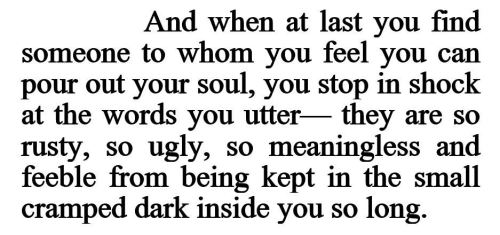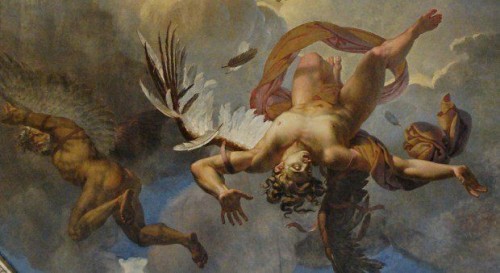Lavender Morning By Chris Cozen

Lavender Morning by Chris Cozen
More Posts from Waltztrvck and Others
![“ Apprehensible, Yet Invisible (that Is, Nothing), Blue Shares Something With Olfaction […] In About](https://64.media.tumblr.com/4744f4d9daea61fd96db693705ee06b2/a566e9710e25e0b6-36/s500x750/c0f170d35e54d6e5eb1cbf7a3dc9f58321770761.png)
![“ Apprehensible, Yet Invisible (that Is, Nothing), Blue Shares Something With Olfaction […] In About](https://64.media.tumblr.com/26358336dfea6d8140a4714ce67572af/a566e9710e25e0b6-88/s500x750/1c046f06325b7c4c081b3ddc0cf658f987bd1d3e.jpg)
“ Apprehensible, yet invisible (that is, nothing), blue shares something with olfaction […] In about 1700, before Novalis and his blue flower, before Goethe and [Werther’s] blue-coat-yellow-vest, Bernard Perrot made a blue-glass scent bottle in the shape of a deeply moulded scallop shell. Its metal stopper is connected by a silvery chain. The back of the bottle is flat with a moulded design of a sun(flower). A paradox of blue: the bottle is both the shell from below, from the deep blue sea and as the sun from above in the clear blue sky […] a Janus head of sorts.” (Carol Mavor, “A Foggy Lullaby”, Blue Mythologies)
Bernard Perrot, Blue Glass Perfume Bottle, c. 1700, Orléans

― Sylvia Plath, The Unabridged Journals of Sylvia Plath
[text ID: And when at last you find someone to whom you feel you can pour out your soul, you stop in shock at the words you utter— they are so rusty, so ugly, so meaningless and feeble from being kept in the small cramped dark inside you so long.]



















Everyone forgets Icarus also flew
1. Jack Gilbert / 2. “The Fall of Icarus” by Merry-Joseph Blondel / 3. Lines attributed to Irish poet Oscar Wilde / 4. “The Fall of Icarus” by René Milot / 5. Charles Baudelaire / 6. “The Lament for Icarus” by Herbert James Draper / 7. Ilya Kaminsky / 8. “Icarus on the Rocks” by Vlaho Bukovac / 9. Nina Mouawad

I Will Tell this Story to the Sun Until You Remember that You are the Sun, Erin Slaughter

Melissa Febos, Abandon Me



by zeewipark










Hamda Al Fahim “Disco Daydreams” spring 2022 couture
“Yes, darling honey, I am a misery without you. So don’t, I beg, be foolish walking over mountains. If you break a leg, I break my heart, remember.”
— Virginia Woolf in a letter to Vita Sackville-West, 28 February 1927
“the morning blueness, chaste, not yet dried of its nighttime tears…”
— Yevgeny Zamyatin, We (trans. Natasha Randall)
Idk if u write, but what would u recommend to a young writer who’s not yet found her own ‘tone’ / voice or character in writing. What I mean is, I love writing… every time I read a certain author I then adopt their pen’s character, I write like them. If I read Plath I’ll go write like her bc I’m inspired. If I read Dostoevsky I’ll go write like him. Idk if it’s necessarily bad bc I think it’s pretty cool to achieve such voices (if they r achieved indeed) or should I just try to find mine? & How?
Hi anon, yes I write but only for myself. It's a sort of therapy for me, I'm definitely not a good writer. So maybe I'm not the right person to answer this question. Anyway, in your message you mentioned Plath and Dostoevsky, I think it's pretty normal to mistake the big impact that this artists can have on you and on your soul with your conviction that you are "copying" them. You already have your voice, it's the way you see the world, the way you perceive things, the way you talk in your head ― the language you speak to yourself everyday.

Sylvia Plath, from The Unabridged Journals of Sylvia Plath
she called herself "unimaginative". She tormented herself with this thoughts. It's just impossible to believe for us, but she was just like you, just like us.
Don't give up🤍
-
 lots-of-little-books liked this · 1 week ago
lots-of-little-books liked this · 1 week ago -
 dreamy-gal reblogged this · 2 weeks ago
dreamy-gal reblogged this · 2 weeks ago -
 luarenah reblogged this · 2 weeks ago
luarenah reblogged this · 2 weeks ago -
 arialabyrinthe liked this · 2 weeks ago
arialabyrinthe liked this · 2 weeks ago -
 wrennette liked this · 2 weeks ago
wrennette liked this · 2 weeks ago -
 lttrsfrmlnrrgby reblogged this · 2 weeks ago
lttrsfrmlnrrgby reblogged this · 2 weeks ago -
 rubensdaughter reblogged this · 3 weeks ago
rubensdaughter reblogged this · 3 weeks ago -
 bbsoleil reblogged this · 4 weeks ago
bbsoleil reblogged this · 4 weeks ago -
 pinkorchidsinspring liked this · 4 weeks ago
pinkorchidsinspring liked this · 4 weeks ago -
 haveyoueverwondered liked this · 4 weeks ago
haveyoueverwondered liked this · 4 weeks ago -
 kikosmusic liked this · 4 weeks ago
kikosmusic liked this · 4 weeks ago -
 lookwhatyoumademelou liked this · 4 weeks ago
lookwhatyoumademelou liked this · 4 weeks ago -
 gayscantslicetomatoes reblogged this · 4 weeks ago
gayscantslicetomatoes reblogged this · 4 weeks ago -
 gayscantslicetomatoes liked this · 4 weeks ago
gayscantslicetomatoes liked this · 4 weeks ago -
 moon-sun-thyme reblogged this · 4 weeks ago
moon-sun-thyme reblogged this · 4 weeks ago -
 wendersfive liked this · 4 weeks ago
wendersfive liked this · 4 weeks ago -
 broken-beak-flower-feast reblogged this · 4 weeks ago
broken-beak-flower-feast reblogged this · 4 weeks ago -
 icrylemonade liked this · 4 weeks ago
icrylemonade liked this · 4 weeks ago -
 tyrannustyrannicide liked this · 4 weeks ago
tyrannustyrannicide liked this · 4 weeks ago -
 lavenderfires reblogged this · 1 month ago
lavenderfires reblogged this · 1 month ago -
 mzmzry reblogged this · 1 month ago
mzmzry reblogged this · 1 month ago -
 imhilien reblogged this · 1 month ago
imhilien reblogged this · 1 month ago -
 thadymiller liked this · 1 month ago
thadymiller liked this · 1 month ago -
 neriumoleander liked this · 1 month ago
neriumoleander liked this · 1 month ago -
 i-read-in-five-languages liked this · 1 month ago
i-read-in-five-languages liked this · 1 month ago -
 yourblueberrymajesty reblogged this · 1 month ago
yourblueberrymajesty reblogged this · 1 month ago -
 yourblueberrymajesty liked this · 1 month ago
yourblueberrymajesty liked this · 1 month ago -
 tealightsgalaxy reblogged this · 1 month ago
tealightsgalaxy reblogged this · 1 month ago -
 the-forest-library reblogged this · 1 month ago
the-forest-library reblogged this · 1 month ago -
 foxteethandflora liked this · 1 month ago
foxteethandflora liked this · 1 month ago -
 mzmzry liked this · 1 month ago
mzmzry liked this · 1 month ago -
 prettylittleproblem reblogged this · 1 month ago
prettylittleproblem reblogged this · 1 month ago -
 liarggh liked this · 1 month ago
liarggh liked this · 1 month ago -
 aitokio liked this · 1 month ago
aitokio liked this · 1 month ago -
 dearace reblogged this · 1 month ago
dearace reblogged this · 1 month ago -
 youplanyourescape reblogged this · 1 month ago
youplanyourescape reblogged this · 1 month ago -
 scribblingface reblogged this · 1 month ago
scribblingface reblogged this · 1 month ago -
 scribblingface liked this · 1 month ago
scribblingface liked this · 1 month ago -
 todayisbrightlywoven reblogged this · 1 month ago
todayisbrightlywoven reblogged this · 1 month ago -
 yts-62 reblogged this · 1 month ago
yts-62 reblogged this · 1 month ago -
 bookcoversproject liked this · 1 month ago
bookcoversproject liked this · 1 month ago -
 zbeok liked this · 1 month ago
zbeok liked this · 1 month ago -
 the-supernatural-atheist liked this · 1 month ago
the-supernatural-atheist liked this · 1 month ago -
 pollywdoodle liked this · 1 month ago
pollywdoodle liked this · 1 month ago -
 sadeleine reblogged this · 1 month ago
sadeleine reblogged this · 1 month ago -
 sadeleine liked this · 1 month ago
sadeleine liked this · 1 month ago -
 lilorphanandie liked this · 1 month ago
lilorphanandie liked this · 1 month ago -
 godiskings reblogged this · 1 month ago
godiskings reblogged this · 1 month ago -
 godiskings liked this · 1 month ago
godiskings liked this · 1 month ago
